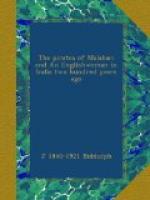The year succeeding Boone’s departure was a stirring one in Bombay. On the 27th February, the Eagle and Hunter galleys, while off Bassein, convoying a Surat ship, were attacked by four of Angria’s grabs. After a five-hours’ engagement, during which the Hunter made three attempts at boarding, an unlucky shot ignited some loose powder, and the galley blew up, every soul on board perishing. A similar explosion, though less serious, took place on board the Eagle, which forced her to take refuge in a shattered condition in Saragon harbour. Here the Portuguese showed such unfriendliness, that the Council were obliged to send other galleys to protect and bring the Eagle away.
Since the conclusion of the Portuguese treaty with Angria, an angry correspondence had gone on between Goa and Bombay, and soon the old causes of quarrel were revived. The chief of these was the levying of duties at certain places. The General of the North, who had tried to force on a quarrel a year before, smarting, doubtless, under the treatment he had received from Matthews at the siege of Alibagh, began to levy duties on provisions coming from Bombay to Portuguese territory. Phipps retaliated by levying customs duties at Mahim, which the Portuguese had always claimed to be free to both nations. The quarrel grew hot. The General of the North forbade all communication with Bombay, and, on the 26th May, a British gallivat was fired on at Mahim. The Council resolved to uphold their rights, but were in a poor condition to do so. Meanwhile, it became known that Angria’s assistance was being invited by the Portuguese. On the 23rd June, a party from Bombay landed and destroyed the Portuguese fort at Corlem, and shelled Bandara. Captain Loader, of the Revenge, without orders, burned the undefended village on Elephanta, for which he was suspended from his command; but at the end of a week he was reinstated. Want of shipping for a time prevented any vigorous prosecution of hostilities on the part of the Council. They were obliged to remain on the defensive, while Portuguese galleys cruised off the island, making occasional raids, killing a militiaman or two, and burning villages. Mahim, Riva, and Darvi were all raided, but with small benefit to the assailants. On the 28th August, at night, a Portuguese force landed and destroyed the fort at Warlee, assisted by the treachery of a renegade Portuguese. On the 3rd and 4th September, two attempts to land at the Breach were repulsed, and the Council were cheered by the arrival of the Salisbury and Exeter from their Red Sea cruise.
Cockburn, of the Salisbury, less churlish than Matthews, at once put two pinnaces and seventy-six men at the Council’s disposal. A small expedition of eleven gallivats under Stanton was also fitted out, and a battery erected by the Portuguese at Surey to hinder provisions coming into Bombay, was captured. One man of the Exeter was killed and another wounded. Just then came news that Angria was fitting out an expedition of five thousand men to attack Carwar, and the Exeter sailed there to defend the factory.




